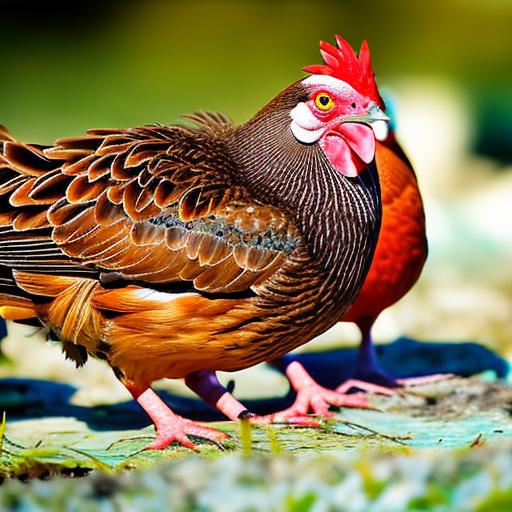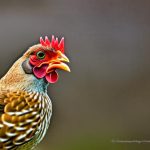Keeping chickens in the Bahamas is a popular and rewarding hobby that offers numerous benefits. Not only do chickens provide fresh eggs and natural pest control, but they also reduce food waste and can even serve as a sustainable food source. In addition, selling eggs or meat can provide an economic benefit for those who choose to raise chickens. Whether you are a seasoned farmer or a beginner looking to start a small flock, keeping chickens in the Bahamas can be a fulfilling and enjoyable experience.
Key Takeaways
- Keeping chickens in the Bahamas has many benefits, including a source of fresh eggs and meat.
- Some of the best chicken breeds for the Bahamas include the Rhode Island Red and the Leghorn.
- A chicken coop should be well-ventilated and provide enough space for the chickens to move around comfortably.
- The size and design of a chicken coop will depend on the number of chickens being kept and the available space.
- Materials for building a chicken coop can include wood, wire mesh, and roofing materials.
Benefits of keeping chickens in the Bahamas
One of the main benefits of keeping chickens in the Bahamas is the availability of fresh eggs. Instead of relying on store-bought eggs that may have been sitting on shelves for weeks, you can have access to eggs that are laid by your own chickens. These eggs are not only fresher but also more nutritious, as they are free from any chemicals or hormones that may be present in commercial eggs.
Another benefit of keeping chickens in the Bahamas is their ability to reduce food waste. Chickens are excellent at consuming kitchen scraps, such as vegetable peels and leftovers, which would otherwise end up in the trash. By feeding these scraps to your chickens, you not only reduce waste but also save money on chicken feed.
Furthermore, keeping chickens can provide a sustainable food source. In addition to eggs, chickens can also be raised for meat. This allows you to have a source of protein that is locally produced and free from any additives or preservatives. Selling eggs or meat can also provide an economic benefit, as there is often a demand for locally sourced and organic products.
Types of chickens suitable for the Bahamas
When choosing chickens for the Bahamas climate, it is important to select breeds that can handle the heat and humidity. Some suitable breeds include the Rhode Island Red, Leghorn, and Sussex. These breeds are known for their heat tolerance and ability to thrive in tropical climates.
It is also important to choose chickens that are disease-resistant. The Bahamas is home to various poultry diseases, so selecting chickens that have a strong immune system can help prevent outbreaks. Additionally, consider the size of the chickens and their ability to forage for food. Smaller breeds, such as bantams, may be better suited for smaller yards or urban environments.
Housing chickens in a coop
Housing chickens in a coop is essential for their safety and well-being. A coop provides protection from predators, such as dogs or raccoons, and also serves as a safe space for the chickens to lay their eggs. Additionally, a coop can help regulate the temperature and provide shelter from extreme weather conditions.
A mobile coop is a great option for those who want to move their chickens around the yard. This allows the chickens to have access to fresh grass and insects, which can improve their overall health and well-being. A mobile coop can also help prevent the buildup of waste in one area, reducing the risk of disease.
Size and design of a chicken coop
The size and design of a chicken coop are important factors to consider when keeping chickens in the Bahamas. Each chicken should have enough space to move around comfortably, both inside the coop and in the outdoor run. As a general rule of thumb, allow at least 4 square feet of indoor space per chicken and 10 square feet of outdoor space per chicken.
Adequate ventilation is also crucial for a chicken coop in the Bahamas. Good airflow helps regulate the temperature and prevents the buildup of moisture, which can lead to respiratory issues in chickens. Windows or vents should be installed to allow fresh air to circulate throughout the coop.
Materials for building a chicken coop

When building a chicken coop in the Bahamas, it is important to choose materials that are suitable for the climate and safe for the chickens. Wood is a popular choice for building coops, as it is durable and provides insulation. However, make sure to use untreated wood, as chemicals in treated wood can be harmful to chickens.
Another option for building a chicken coop is using PVC pipes. This material is lightweight, easy to work with, and resistant to the elements. PVC coops can also be easily disassembled and moved if needed.
Regardless of the material used, it is important to provide insulation for the chickens. This can be achieved by adding insulation panels or using straw or hay as bedding material.
Location of the chicken coop
Choosing the right location for the chicken coop is crucial for the health and well-being of the chickens. The coop should be placed in an area that receives adequate shade, especially during the hottest parts of the day. This helps prevent heat stress in chickens.
The coop should also be protected from strong winds and heavy rain. Consider placing the coop near a wall or fence to provide additional protection from the elements.
Having the chicken coop close to the house can also be beneficial for easy access and monitoring of the chickens. This allows you to quickly check on them and provide any necessary care or maintenance.
Maintaining a clean and healthy chicken coop
Keeping the chicken coop clean and free of pests is essential for the health of your chickens. Regularly cleaning out the bedding and removing any waste helps prevent the buildup of bacteria and parasites. It is recommended to clean out the coop at least once a week, or more frequently if necessary.
Using natural cleaning products, such as vinegar or lemon juice, can help keep the coop clean without exposing your chickens to harmful chemicals. Additionally, providing a dust bath area for your chickens can help control pests, such as mites or lice.
Fresh water should always be available for your chickens. Make sure to clean and refill their water containers regularly to prevent contamination.
Feeding and caring for chickens in the Bahamas
Providing a balanced diet is crucial for the health and well-being of your chickens. A mix of grains, such as corn or wheat, and vegetables, such as lettuce or carrots, can provide the necessary nutrients for your chickens. It is also important to provide access to fresh grass and insects, as these are natural food sources for chickens.
Supplements can also be beneficial for your chickens. For example, oyster shells can be provided to ensure they receive enough calcium for strong eggshells. Additionally, providing grit, which is small stones or sand, helps chickens digest their food properly.
Regularly monitoring the health of your chickens is important. Look out for any signs of illness or distress, such as loss of appetite or changes in behavior. If you notice any abnormalities, consult a veterinarian who specializes in poultry.
Why keeping chickens in the Bahamas is a good idea
Keeping chickens in the Bahamas offers numerous benefits, including access to fresh eggs, reducing food waste, and providing a sustainable food source. Chickens are relatively low-maintenance animals that can thrive in the Bahamas climate with proper care and housing.
If you are considering keeping chickens in the Bahamas, there are many resources available to help you get started. Local agricultural extension offices or poultry associations can provide valuable information and support. Additionally, online forums and communities dedicated to backyard chicken keeping can offer advice and guidance from experienced chicken owners.
In conclusion, keeping chickens in the Bahamas can be a rewarding and enjoyable experience. Not only do chickens provide fresh eggs and natural pest control, but they also offer economic benefits and contribute to a sustainable food source. By following proper care and housing practices, you can create a healthy and thriving flock of chickens in the Bahamas.
If you’re considering keeping chickens in the Bahamas, you’ll definitely want to check out this informative article on large chicken coop ideas. Having a spacious and well-designed coop is essential for the health and happiness of your feathered friends. This article from Poultry Wizard provides valuable insights and practical tips on creating a comfortable living space for your chickens. Whether you’re looking for inspiration or guidance on building your own coop, this resource will surely be of great help. Read more here.
FAQs
What are the benefits of keeping chickens in the Bahamas?
Chickens can provide a source of fresh eggs and meat for personal consumption or sale. They also help control pests and weeds in gardens and can provide fertilizer for crops.
What are the challenges of keeping chickens in the Bahamas?
Chickens require proper housing, feeding, and care to stay healthy. They can also attract predators such as dogs, cats, and snakes. Additionally, chickens can create noise and odor issues for neighbors.
What breeds of chickens are best suited for the Bahamas?
Breeds that are heat-tolerant and can handle high humidity are best suited for the Bahamas. Some examples include the Rhode Island Red, Plymouth Rock, and Leghorn.
What regulations are in place for keeping chickens in the Bahamas?
Regulations vary by island and municipality. Some areas may require permits or limit the number of chickens that can be kept. It is important to check with local authorities before starting a chicken operation.
What is the cost of keeping chickens in the Bahamas?
The cost of keeping chickens can vary depending on factors such as housing, feed, and veterinary care. However, chickens can be a cost-effective source of food and fertilizer for those who are willing to invest the time and resources.
Meet Walter, the feathered-friend fanatic of Florida! Nestled in the sunshine state, Walter struts through life with his feathered companions, clucking his way to happiness. With a coop that’s fancier than a five-star hotel, he’s the Don Juan of the chicken world. When he’s not teaching his hens to do the cha-cha, you’ll find him in a heated debate with his prized rooster, Sir Clucks-a-Lot. Walter’s poultry passion is no yolk; he’s the sunny-side-up guy you never knew you needed in your flock of friends!







